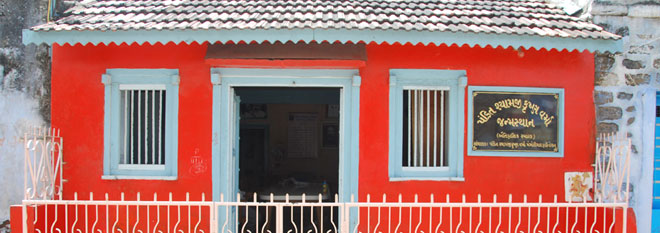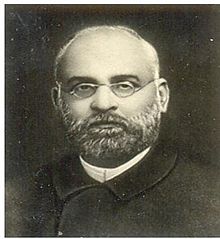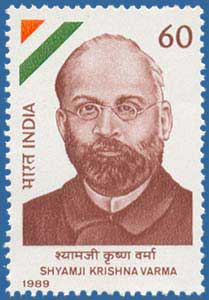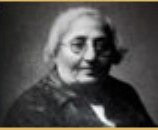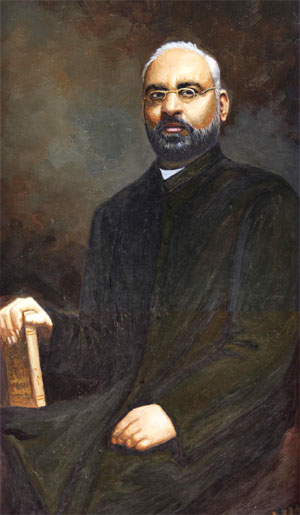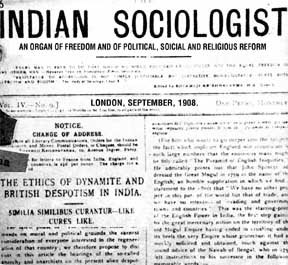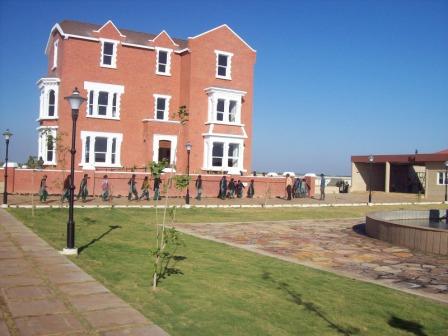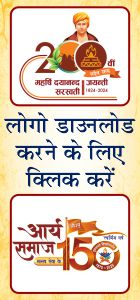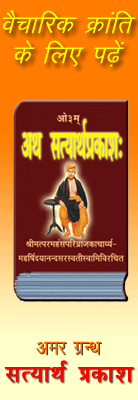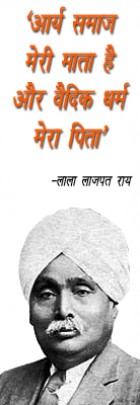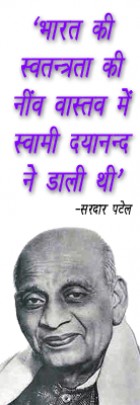Shyamji Krishna Varma
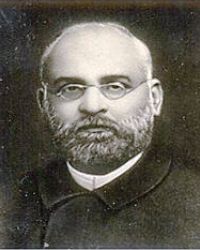
Father :
Karsan Bhanushali (Nakhua)

Mother :
Gomatibai

Spouse :
Bhanumati Krishna Varma
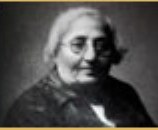
Pandit Shyamji Krishna Verma was one of those staunch nationalists and patriots who lived in England and mentored the cause of India's freedom from the British rule. He led an eventful life, largely in Europe during the most crucial period of India's struggle for freedom, helping revolutionaries and creating a nucleaus for their activities. Shyamji Krishna Verma was born on 4th october, 1857 at Mandvi village of Kutch District in Gujarat. He lost his mother during early childhood. He had his primary education in the village school at Mandvi and secondary education at Bhuj. He was a brilliant student. He acquired a deep knowledge of Sanskrit for which he was awarded the title of 'Pandit'. He was married to Bhanumati, the daughter of a rich merchant, Seth Chhabildas Lalubhai of Bombay in 1875.
Shyamji Krishna Verma was a great disciple of Swami Dayanand Saraswati and became the first President of Bombay Arya Samaj. He later joined the Oxford University and was appointed Assistant Professor of Sanskrit at Blliol College. Subsequently, he entered Temple's Inn and was the first Indian Bar-at law. He returned to India in January, 1888 and served for a short time as Diwan of Ratlam. He started practice at Ajmer and earned fame as an advocate. He became a member of the Municipality of Ajmer city, served as Diwan of Ajmer and later as Diwan of Junagarh.
He started the publication of a monthly 'Indian Sociologist' which became a vehicle of revolutionary ideas. In February 1905, he established the Indian Home Rule Society to raise his voice against British domination in India. He established 'India House' in London to help Indians visiting England. Vinayak Damodar Savarkar and his brother Ganesh, Lala Hardayal, Biren Chattopadhyaya and V.V.S. Iyer were some of the beneficiaries of 'India House'. He raised strong protests against the British rule in India by publishing pamphlets, writing books and delivering speeches. On account of his political activities, he was forced to leave England. He went to Paris, where he continued his activities supporting India's liberation. Due to the outbreak of the second World War, he could not stay in Paris and had to go to Geneva in Switzerland, where he spent the rest of his life.
If the true and precise history of Indian Freedom Struggle was written and taught to the people of India after independence, the name of Pandit Shyamji Krishna verma would not have been unfamiliar to the general public of India. His name should be on the front page of the chapters of Indian Freedom Struggle in 19th century as Pandit Shyamji Krishna verma initiated the movement in London in 1905, twenty years before Gandhiji entered into the politics of Indian independence. He advocated the principle of non-cooperation & movement in his newspaper 13 years before Gandhiji put it into practice calling the movement Asahakar Andolan. Although Pandit Shymaji preached non-violence movement for the Indian Independence, he never ruled out the use of arms and violence if required to free his Motherland from British occupation.
Pandit Shyamji Krishna verma was a great patriot, philanthropist and political propagandist of Bharat -India. He will be remembered in the history of the freedom movement of Bharat as a great revolutionary journalist, writer and a maker of freedom fighters and the most inspiring genius of freedom movement for Indian youths. Fired with a deep patriotic urge and nationalist emotion, Pandit Shyamji Krishna verma launched the freedom movement in England in 1905. He was not only a great freedom fighter and inspirer but also a great and profound Sanskrit & English scholar. Professor (Sir) Monier Williams held very high respect for Shyamji. In his testimonial he said, “Assuredly no English or European teacher could possibly be his equal in expounding the grammar of Indian languages according to the principles of native grammarians. I may add that I know no other Pandit who combines a considerable knowledge of Greek and Latin with great Sanskrit attainments.” A famous indologist and Sanskrit scholar professor Max Muller also spoke very highly of Shyamji. Pandit Shyamji sacrificed his whole life and earnings for the freedom of his motherland from the foreign rule of British Imperialism. He was a brave and committed comrade who made his headquarter right in the heart of British Empire, their capital, London, to fight against British Rule in India. He was one of the foremost leaders of New Nationalist Movement during the most critical years of awakening Indian mass. He carried out rigorous propaganda in Europe for the cause of Freedom Movement of Bharat. Pandit Shyamji was the first and foremost Indian political leader to demand complete independence from British despotism and to use the term Swaraj (SELF RULE), which was later adopted by Dadabhai Naoroji and his colleagues.
Shyamji was born in a historic year of 1857 when the first war of Indian Independence was fought against British Imperialism, where thousands of freedom fighters sacrificed their life to liberate their Motherland from foreign rule. Shyamji was borne 30th October 1857 in Mandavi of Kutchh province, according to the official register in Geneva. His Father, Karasan Bhanushali, known by nickname “ Bhulo Bhanushali” was economically poor. He worked as a labourer for cotton Press Company exporting cotton abroad. His mother, Gomatibai was very brave and pious lady. Unfortunately, she died when Shyamji was just eleven years old and her mother took over the responsibility to raise him. Shyamji was very intelligent from his childhood. He completed his primary and secondary education in Mandavi and Bhuj in Kutchh Province. He came to Mumbai for further education and joined Wilson High School. He had a great love for Sanskrit from his childhood. He acquired his preliminary lessons in Sanskrit language from Shri B B Pandya in Mandavi. He acquired further knowledge of Sanskrit language in great depth from Shashtri Vishvanath of Mumbai & mastered the language.
Shyamji got married to Bhanumati, a daughter of a wealthy businessman Seth Shri Chahbildas Lallubhai of Bhatia community and sister of his school friend Ramdas, in 1875. In 1876, He came in touch with Swami Dayanand Saraswati, an exponent of Vedas, radical reformer, and staunch nationalist and founder of Arya Samaj. He became his disciple. Swamiji was very impressed with Shyamji’s knowledge of Sanskrit and religious literatures. He guided and inspired Shyamji to conduct lectures on Vedic Philosophy and Religion. In 1877, Shyamji toured all over Bharat propagating the philosophy of Vedas. This tour secured him a great public recognition all over Bharat and many prominent scholars admired him for his knowledge and speeches. He was the first non-Brahmin, who was conferred the prestigious title of Pandit by the Pandits of Kashi in 1877. Professor Monier Williams, learned Professor of Sanskrit at oxford, attended the lecture of Pandit Shyamji in Mumbai in 1876. He was so impressed with Shyamji’s deep knowledge, mastery and his oratory excellence over Sanskrit Language and literatures. He saw a great potential in this young man and offered Shyamji a job as his assistant in first instance.
Shyamji arrived in England in 1879 on invitation of professor Monier Williams of Oxford University. He joined professor William as his assistant. Shyamji and also joined Balliol College on 25th April 1979 with the recommendation of professor Williams. He passed his B A in 1883. He was invited to read papers on “the origin of writing in India” by the secretary of Royal Asiatic Society. Pandit Shyamji’s speech was very well received there and he was elected as a non-resident member of the society. There he not only read his own paper on the subject of “ Sanskrit as a living language of India”, but also he read the patriotic Sanskrit poem sent by RamDas Sena, a learned ZAMINDAR of Behrampur, and translated it into English for audience. This patriotic poem might have created the spark of patriotism in Shyamji. In 1982 Shyamji was elected as honorary member of “Empire Club”. Here in England, he enacted from success to success. He came across many thinkers, Philosophers and scholars and they all admired this genius young man from India. Indologist Max Muller and vice chancellor of Oxford University, Dr B Jowett thought very highly of Shyamji. He returned to India in the end of 1883 and came back with his wife Bhanumati.
In 1885 he returned to India and enrolled himself as advocate of Mumbai High Court on19th January 1985 and started his practice. Then he was appointed as Diwan (chief minister) of Ratlam State by the king of the state. He resigned his high post in May 1988 due to ill health. The king granted him a lump sum of RS 32052 as signal mark of his high regards for his service. Then he stayed in Mumbai for a while. He settled in Ajmer, headquarter of his Guru Swami Dayanand Saraswati, and started his practice at British Court, Ajmer. Here he earned the bigger income than Ratlam. He made industrial investment in three cotton presses and secured a permanent income, which made him independent of any services for remainder of his life. He also served for Maharaja of Udaipur as member of his council from 1893 to 1895. He took position of Diwan of Junagadh State in 1895 and resigned in 1897 due to bitter experience of British agent’s interference. This incidence shook his faith in British Rule.
In 1897, the atrocities inflicted during the plague crisis in Poona on Indians by British Government, stunned and shocked Shyamji. He then felt full justification for the nationalist stand taken by Nathu brothers and Tilak. On 20th June 1897, Chafekar brothers of Natu family assassinated the tyrant Commissioner of Plague, Mr Rand and his Lieutenant Ayerst. Shyamji was well acquainted with Damodar, one of the Natu Brothers, whom he employed as his bodyguard on recommendation of Bal Gangadhar Tilak, while Shyamji was Diwan of Junagadh. He has foreseen his future to ending up in jail like Tilak and others if he would carry out his future plan of this movement as the political climate of India became highly suppressive and repressive after the assassination of Mr Rand and Ayerst. Shyamji rejected his lucrative career to immigrate to England in March 1897, just after the arrest of Damodar, with a view to carry out the fight from abroad. He deliberately intended to launch uncompromising propaganda against autocratic, exploitative and oppressive regime of British Rule and to create support in England and Europe for THE INDEPENDENCE OF INDIA.
Shyamji left his Motherland with the great determination to work restlessly for the liberation of India from foreign rule. He had only one business in mind to establish a business of training and inspiring the young sons and daughters of India to strive for the liberty of their Motherland. He decided to dedicate all his money, time, scholarship, literary power and above all his life to serve his Motherland selflessly.
In 1898, when a free press defence committee was formed in order to resist police attack upon liberty of all opinions Shyamji subscribed generously to its funds. In the same year Pandit Shyamji met Sardarsinh Rana, his future desciple, associate and friend, who came to London to study law at inner Temple. In 1899, Shyamji strongly criticised Gandhiji, a lawyer from Natal, for supporting British Government in Boer war, when Boers were fighting for their very existence of their small nation. Shyamji started giving fiery speeches in the free atmosphere of Hyde Park in London, calling for the supports of progressive and sympathetic Britons in the right cause of India’s emancipation. The fire brand speech of Shyamji set a fire of patriotic feeling in the heart of by passing Indian lady in audience, who would be destined to be come a “ Mother of Indian Revolution” in future under the discipleship of Pandit Shyamji Krishna verma.
Shyamji, a follower and disciple of Spencer’s philosophy, announced £1000 to establish the lectureship at university of Oxford in memory of Herbert Spencer, a apostle of the freedom of the individuals and principle of a British philosophers, at his funeral service held in Golders Green, on 14/12/1903, as a great tribute and respect to him and his work. He also planned the programme of carrying out Spencerian propaganda for the benefit of his countrymen. On Herbert Spencer’s 1st death anniversary, 8th Dec 1904, Shyamji announced that Herbert Spencer Indian fellowships of RS 2000 each were awarded to enable Indian graduates to finish education in England. He also announced additional fellowship in memory of the late swami Dayanand Saraswati the founder of Arya Samaj along with further four fellowships in the future.
In 1905, Shyamji embarked on his great life work for the freedom of his motherland. Shyamji’s new career began as a full-fledged political propagandist and organiser for the alignment of complete independence of India. Shyamji finally made his debut in Indian politics by publishing first issue of his English monthly “The Indian Sociologist” – an organ of freedom and of political, social and religious reform in January 1905 from his address 9 Queens Wood Avenue, Highgate, now known as 60 Muswell Hill Road, Highgate. This strong, powerful, realistic, ideological monthly served a great purpose in uplifting mass against British rule and created many more intellectual revolutionaries in the India and abroad to fight for the freedom of India.
On the 18th February 1905, Shyamji inaugurated a new organisation called “The Indian Home Rule Society”. The first meeting held at Shyamji’s residence at Highgate and the meeting unanimously decided to found “The Indian Home Rule Society” with the object of:
1) Securing Home Rule for India
2) Carrying on Propaganda in England by all practical means with a view to attain the same.
3) Spreading among the people of India in knowledge of freedom and national unity.
As the racial prejudice barred the way to many boarding houses and hostels to Indian students, he foresaw the necessity of starting a hostel for Indian students. He bought a freehold property at 65, Cromwell Avenue, Highgate and he made an announcement of forthcoming opening of famous India House, a hostel of Indian students with living accommodation for 25 students. India House formally inaugurated on 1st July by Mr. H. M. Hyndman, a leader of social, democratic federation, in presence of many dignitaries, such as Dadabhai Navarozji, Lala Lajpatrai, Madam Cama, Mr. Swinney (from positivist society), Mr. Quelch (the editor of Justice) and Madam Despard (Irish Republican and Suffragette). Declaring “India House” open, Mr H M Hyndman gave a most eloquent and sympathetic speech. He remarked, “ As things stands, loyalty to Great Britain means treachery to India. The institution of this India house means a great step in that direction of Indian growth and Indian emancipation, and some of those who are here this afternoon may live to witness the fruits of its triumphant success.” How Prophetic words of a great statesman!
The main purpose of Shyamji Krishna verma to open this hostel was to create great patriotic revolutionaries by implementing his ideology for the freedom of India. He succeeded in his vision and he produced the greatest revolutionaries such as Madam Bhikhaiji Cama, Sardarsinh Rana, Krantivir Vinayak Savarkar, Virendra Chattopadhyay, and Hardayalji etc.
He arrived in Paris in early 1907 and continued his work vigorously. The British media still remained highly critical of him and tried to use their influence in French media circle. The British government tried to extradite him from France with no success as Shyamji established a great friendship with many top French politicians who supported him. Shyamji’s name was dragged into the most sensational trial of Mr. Merlin, an Englishmen, at Bows Court for writing an article in “liberators” published by Shyamji’s friend, Mr. James. Shyamji restlessly worked in Paris to procure support for Indian Independence from European countries with great success. He agitated for the release of Savarker and acquired great support all over Europe and Russia. Guy Aldred wrote an article in the Daily Herald under the heading of “Savarker the Hindu Patriot whose sentences expire on 24th December 1960”. This created a great support in England too. As the presence of Indian nationalist in Paris would be seriously jeopardised on outbreak of a European war and the visit of King George to Paris, to set a final seal of Entente Cordiale. In 1914, Shyamji foresaw the fate and shifted his headquarter to Geneva. He continued his struggle for Indian independence, morally and financially, with same enthusiasm but with some restriction as the pledge of political in-action he had given to Swiss government during the entire period of war. He kept in touch with his old friends but he could not support them fully. As he was restricted from all political activities and isolated from his friends, e.g. Ranaji, Madam Cama, and his created revolutionaries, like Savarker, Hardayal, etc. this isolation threw him into the company of Dr. Briess who was president of Pro India Committee in Geneva. Shyamji was later shocked and heartbroken when he found out that Dr. Briess was a paid secret agent of the British government, as well as the treachery of his old friend. This event left a deep scar in his heart but his support to the cause remained at his heart throughout.
He was always prepared to help for the cause of freedom and injustice. He offered a sum of 10 000 francs to the league of nations for the purpose of endowing a lectureship to be called President Wilson (USA) Lectureship for the discourse on the best means of acquiring and safe guarding national independence consistently with freedom, justice, and the right of asylum accorded to political refugees. It is said that the league rejected his offer due to political pressure from British government. When he made a similar offer to Swiss government, it was also turned down. He declared another lectureship to the president of Press Association of Geneva at the banquet given by Press Association of Geneva where 250 journalists and publicists which included the president of Swiss Federation and the league of nations. Shyamji’s offer was applauded on the spot but it met with the same fate as before. Shyamji was very much disappointed with such decision and he published all his abortive correspondence in this matter in his new issue of the Sociologist on Dec. 1920, after a lapse of almost 6 years. His last 2 issues of Indian Sociologist were published in August and September 1922, could be taken as his last political will and testament of his work. After several health problems, a great Indian patriot, Shyamji Krishna verma, breathed his last in hospital at 11:30pm on 30th March 1930 leaving his wife Shrimati Bhanumati Krishna verma with no heir.
British government in India and Britain suppressed the death news of Pandit Shyamji. Although the best tribute paid to him by a great revolutionary, Sadar Bhagat Singh and his co-revolutionist brothers in Lahore Jail where they were undergoing a long-term drawn out trial. Maratha, a daily newspaper started by Shri Tilak in Marathi, paid very touching tribute to a great revolutionary.
His wife Bhanumati carried out the good work of Shyamji even after his death. She donated 10,000 Swiss Francs in memory of Shyamji to the Geneva University to be used every year for printing and approved thesis on subject of sociological interest. She also donated 10 000 Swiss Francs to the hospital in Geneva for the treatment of poor and needy. She presented the whole of the Sanskrit and Oriental Library of Pandit Shyamji to the institute De Civilisation Indienne in the Surbonne. She donated 90,000 franks to established a trust in Surbonne University for awarding scholarship to a suitable number of selected Indian students for prosecuting higher studies in the university. Even today the memory of Shyamji and his wife is preserved in Sorbonne University in the form a memorial plaque.
Pandit Shyamji Krishna verma did not live to witness the independence of Bharat, but his efforts, conviction and confidence of India gaining its freedom from British rule in future was strong and unshakable as he made the prepaid arrangements with the local government of Geneva, Ville de Geneve, and St Georges cemetery to preserve his & his wife’s ashes (Asthis) at the cemetery for one hundred years and to send their urns to India whenever it becomes independent during that period.
पं. शयामजी कृषण वरमा ने ४ अकतूबर, १८५ॠको कचछ (गजरात) के माणडवी गराम में क वैशय परिवार में जनम लिया। वे महरषि दयाननद के पकके शिषय वं संसकृत के परकांड पंडित थे। शयामजी कृषण वरमा ने अपनी करांतिकारी गतिविधिया इंगलैणड, जरमनी, फरांस व सविटजरलैंड आदि देशों से संचालित कीं। इनहोने इंगलैणड में १९०५ में ‘होमरूल सोसायटी’ व ‘इंडिया हाउस’ होसटल की सथापना की। १९०५ में उनहोंने ‘इंडियन सोशियोलोजिसट’ नाम का अंगरेजी पतर निकाला। इस पतर में à¤à¤¾à¤°à¤¤ में अंगरेजों दवारा किये जा रहे करूर अतयाचारों की पोल खोली जाती थी। इंगलैंड में गिरफतारी के à¤à¤¯ से वे पेरिस पहचे। ‘इंडिया हाउस’ करांतिकारी गतिविधियों का केनदर बन गया। à¤à¤¾à¤°à¤¤ में रासबिहारी बोस ने २१ फरवरी, १९१५ को सारे देश से क साथ अंगरेज हकूमत को उखाड़ फेंकने की योजना बना रखी थी। उनकी मदद के लि इनहोंने मैडम कामा को साथ लेकर जरमनी से सटीमरों दवारा हथियारों का जखीरा व ‘बम बनाने की विधि’ पसतक को गपत रूप से à¤à¤¾à¤°à¤¤ à¤à¥‡à¤œà¤¾à¥¤ कछ विदवानों की मानयता है कि १८५ॠकी करांति के सूतरधार नाना साहब पेशवा गपत रूप से शयाम जी कृषण वरमा को आरथिक सहायता à¤à¥‡à¤œ रहे थे। लेकिन यह शोध का विषय है। परथम विशव यदध में à¤à¤¾à¤°à¤¤à¥€à¤¯ सैनिकों को उकसाने पर फरांस की सरकार ने इनहें राजदरोही घोषित कर दिया। अत: शयाम जी कृषण वरमा गपत रूप से सविटजरलैंड चले गये। निरंतर संघरष करते-करते à¥à¥© वरष की आय में ३१ मारच सन १९३० को जिनेवा में à¤à¤¾à¤°à¤¤ मा का यह सचचा सपूत इस संसार से सदा के लि विदा हो गया।

